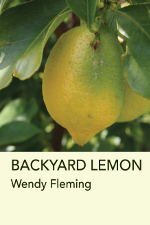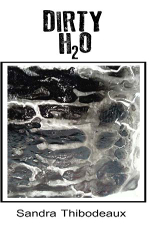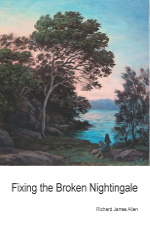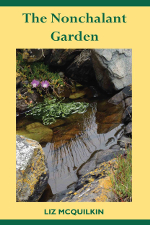



Even if the Sun by Nola Firth
Melbourne Poets Union, 2013
Fixing the Broken Nightingale by Richard James Allen
Flying Island Books, 2013
The Nonchalant Garden by Liz McQuilkin
Walleah Press, 2014
DIRTY H2O by Sandra Thibodeaux
Mulla Mulla Press, 2014
Backyard Lemon by Wendy Fleming
Melbourne Poets Union, 2014
Whether new or established, it’s part of a poet’s work to ask: How far can my words go; how much can they capture; where are their limits? The five Australian poets reviewed here each have their own methods of asking these questions. As a reader and writer of poetry I’ve learned a lot from the sometimes quiet, sometimes bold and always courageous ways they’ve answered them.
Even if the Sun is Nola Firth’s first poetry collection, taking its title from Shunryu Suzuki’s Zen Mind, Beginners Mind. ‘Even if the sun were to rise from the west the bodhisattva has only one way’, the quote reads, and this sense of singular purpose reverberates through each of the poems in this short book.
Firth divides her twenty poems into those about the past (‘People and memory’), the Australian landscape (‘Country’), and meditative practice (‘Zen’). Using an uncomplicated vocabulary, Firth creates a space where poetry can mirror experience in a direct, unadorned way. For anyone who has tried to untie the knots of their own mind through meditation, Firth’s ‘Zen’ poems will probably speak loudest. In these, she lays bare some of the less-than-transcendent moments of her practice:
And sharp, angry self also comes. We watch the shadows move over the floor as the earth turns and want the shadows to hurry up and move to lunch time.
Throughout this section Firth’s clear language leaves room for moments of flair. In the title poem, she describes ‘the door dogs / Sleep and Boredom’ and ‘a green translucent silence’ that comes over her in their wake. But it’s when Firth moves out of the meditation hall and applies her Zen lens to Australian landscapes that intriguing contrasts start to emerge. Corrugated iron, for example, turns delicate as a Japanese maple:
Now time rattled, rain settled, rouge rusted, your tin lace lichen falls in flakes and lets in the sky. The clunk filled tank an empty gong. (‘Ode to Corrugated Iron’)
Firth delights in moulding new adjectives like ‘clunk filled,’ ‘square frisbied’ or even ‘sun-creaking’, which has a fantastic sense of inland heat. These novel combinations create texture alongside lines that are starker:
Water falling out of the sky, sings steady frog songs on roofs and dimpled windscreens, wraps me in its wet life mantras, holds me, child safe (‘Rain’)
The six poems in ‘People and memory’ show Firth equally clear-eyed as she records her own childhood, new generations and the connections and tensions between the two. One of the brightest moments here is ‘Plugged In’, where Firth compares the ‘neat lolly buttons’ of a tablet computer to an earlier learning device:
My Grade One slate was also black, slim, neat wood framed, and independent of cords. I sat with my friends, cross legged on the mat, dust dried fingers pushing chalk, spelling out words.
Even if the Sun operates with the humility and care of a meditative mind. Firth isn’t yet aiming to push poetic boundaries, but working with precision to craft each line, creating poems that record and reflect what is.
Jumping from a first book to a tenth book, it’s worth noticing that the quest for enlightenment is also a concern in Richard James Allen’s Fixing the Broken Nightingale. For Allen, though, there’s no more time to be tentative – this is poetry that lays its subjects bare, asks huge questions and refuses to allow us to read from a safe distance. Allen also divides his work into themed sections, starting with ‘Natural Disasters’ (‘an array of darkly comic verse’, he explains) and ending with ‘A Scheme for Brightness’, which ‘probes and finally affirms the value of art and in particular poetry in the face of the daunting and unanswerable questions.’
Allen doesn’t ever seem daunted. On the contrary, he seems fearless, at times even exposed. ‘Would I be satisfied / if I came inside you?’ he asks in ‘13 Acts of Unfulfilled Love’, which goes on to include the lines: ‘She walks away, letting the come slide down the long / stream from the depths of her cervix to her ankles.’ The love poems that make up this particular section (‘Unanswered Questions’) might be a little too raw for more genteel readers, but Allen’s frankness is refreshing when he starts asking questions about the value of poetry. The poem ‘in the storm’, for example, seethes quietly on the page:
there is some issue of why bother speaking when no one is listening there is some issue of exactly what one is trying to achieve there is plenty of confusion enough to go around
This is followed by the even more doubtful ‘Aubade’, where Allen asks, ‘Did I once believe in the power of poetry? Was I swaddled like a baby / in a blanket of words?’ Here, he strives for a definitive answer to that question that follows all poets around, whether they write books, paste-up poems or simply tap lines into their phone: What’s the purpose of doing this?
All that said, Fixing the Broken Nightingale isn’t always under pressure to reveal the inner workings of a relationship or find a purpose for art. When Allen combines his openness with levity, his work feels natural, connected and even more liberated. ‘Famous Person,’ for example, takes only six lines to recreate the horrifying jolt that comes when a friend’s success is discovered:
I got a shock seeing you in the paper I’d just finished putting you out of my mind and now where are you and where’s my mind the newspaper sits on top of the recycling pile glaring at me
Even if you’re immune to creative jealousy, it’s still delicious to imagine the details of the story that hangs off these few lines. There’s a similar intrigue to poems like ‘what I did / on my nervous breakdown’ or ‘This poem cost me 24 dollars in cab fare’. When Allen hits this dark yet hilarious note, it’s impossible to stay outside his poems; we take up his invitation to walk right in, without knocking.
‘Always a teacher, never a writer’ is Tasmanian poet Liz McQuilkin’s description of her life up until retirement, when she enrolled in a poetry workshop with former Island editor Gina Mercer. You could argue – and McQuilkin hints at this at times – that it’s a shame to wait so long to start writing, but in McQuilkin’s case, years spent teaching poetry and plays have paid off. The Nonchalant Garden does not read like a first book. Like Nola Firth’s Even if the Sun, the poems in The Nonchalant Garden have a clarity that comes from stripping away unnecessary flourishes. Everything on the page is in its place, and has a reason to be there.
One of the high points of the book is a longer poem called ‘Perfect Timing’, in which an elderly mother’s last trip away from her nursing home is remembered with deeply affecting gentleness:
She turns, smiles as I enter: I’m never alone, never lonely, while I can see the river – spinnakers billowing, white-caps cavorting. But look, today the river is still and smooth, like Alice’s glass – Clutching handbag and stick, She canters into the foyer, announcing: This is my daughter. And today’s my eighty-eighth birthday.
While many of the poems here are personal, McQuilkin’s conversational style invites her readers in, whether she’s talking about the pleasures and difficulties of ageing, the repercussions of war on family, or even a topic as complicated as voluntary euthanasia. In ‘Word Music’, McQuilkin manages to weave thoughtful humour around a passionate argument:
Yet when I say voluntary euthanasia, that lyrical term of release, a hush settles in the room – the air is leaden, postures stiffen, talk is trapped in awkward pauses. So I fill them With phrases I’ve come to love: die with dignity, plan your valediction, be at peace. These lilt with alliteration, Captivate with assonance.
It’s clear from McQuilkin’s precise use of punctuation and unwillingness to leave lines incomplete that she wants her poetry to be immediately intelligible. She’s also keenly aware of her style, and of its pitfalls. At the end of the book, she writes:
I need my muse to loosen up, take risks, let go, rebel. He’s too polite, too much the senior-prefect, smiling with decorum, chortling when appropriate. (‘Writer’s Cramp’)
McQuilkin’s honesty is charming, but her doubts are misplaced. Having waited so long for her turn to speak, she now has the floor, and is ready to remind us why poetry doesn’t always need to take chances to make its mark.













